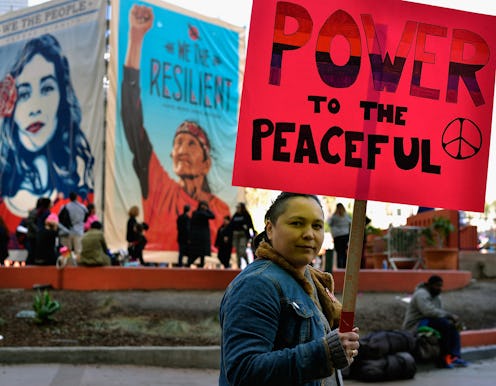News
Republicans Went After Protections For Indigenous Domestic Violence Survivors — Again

House Republicans unsuccessfully attempted to repeal a provision in the Violence Against Women Act that's intended to protect Native women, HuffPost reported on Wednesday. This specific provision gives tribal courts limited power to hold non-Native perpetrators accountable for violence against indigenous women, which advocates say is crucial.
According to HuffPost, Wisconsin Rep. Jim Sensenbrenner led the charge to repeal this provision in the Violence Against Women Act (VAWA). He argued that a tribal court will not uphold the constitutional rights of a non-Native person who was accused of domestic abuse, the outlet reported. The House Judiciary Committee ultimately rejected Sensenbrenner's call to repeal the provision and voted in favor of reauthorizing VAWA, according to Roll Call. The bill, which is currently expired, will now head to a full House vote.
Lori Jump, the assistant director of the StrongHearts Native Helpline — a domestic violence hotline for indigenous women — and a citizen of the Sault Ste. Marie Tribe of Chippewa Indians, tells Bustle that this VAWA provision is essential to the safety of indigenous women.
"At the end of the day, every woman has the right to be safe in their home and they have a right to access justice," she says. "When you’re a Native woman living on tribal land, your access to justice is extremely limited because of the restrictions that have been placed on jurisdictions for tribes across this nation."
The VAWA provision allows tribes limited criminal jurisdiction in domestic violence cases; tribal courts are otherwise not allowed to prosecute non-Native perpetrators for crimes committed in Indian Country. But federal authorities often don't prosecute cases involving tribal communities that are referred to them.
"We are dependent upon a federal system that has failed to act," Jump adds. "If [federal prosecutors] decide not to take a case involving a non-Native, the tribe has no power to find justice."
New Mexico Rep. Deb Haaland, one of two Native American women serving in Congress, tells Bustle that "Native American women experience violence at exceedingly disproportional rates." An overwhelming number of those incidents, she says, are committed by non-Native people.
"Without the VAWA provision to ensure Tribes can prosecute non-Indian perpetrators that commit domestic violence and sexual crimes against Native American women, tribal sovereignty is ignored and women are at risk of being less safe, especially when crimes occur in remote locations," Haaland says. "Native American women deserve to be just as safe and have the same access to justice."
Republican opposition to include protections for Native women in the bill isn't. It happened in 2012, too, the first time this provision was included in the VAWA.
On the Senate floor that year, Vermont Democratic Sen. Patrick Leahy emphasized why this particular provision was important for protecting indigenous women. Without it, he said, it's up to federal and state authorities to handle domestic violence incidents against Native women by non-indigenous people.
And given the physical distance between reservations and police departments, as well as tribal communities lacking the resources "to respond to these cases," these cases would go neglected, he added. "Effectively, these [non-Native] perpetrators are immune from the law, and they know it," Leahy said in his argument. This provision, he noted, gives tribal courts limited jurisdiction to prosecute certain domestic violence cases involving alleged non-Native perpetrators.
The refusal to acknowledge the importance of this particular VAWA provision aside, Jump says that many people "don’t seem to understand what the issues are for Native Americans."
But there are things that others can do help indigenous communities in this regard, she says. "Number one: educate yourself. Number two: reach out to your representative and educate them," Jump adds. "Support the idea that every woman, regardless of where she lives, has the right to safety and access to justice."
"If we can get our allies to do that," she says, "we have a better chance to improve the outcome for our people."
This article has been updated.